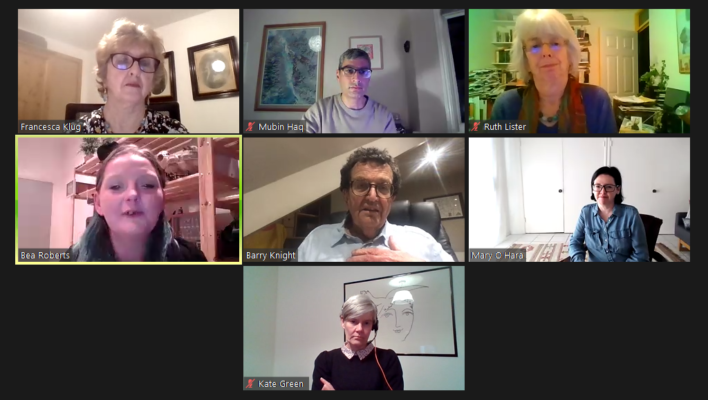Launching Ruth Lister’s book ‘Poverty’

Ruth Lister, a member of the House of Lords and Emeritus Professor of Social Policy at Loughborough University, recently launched the second edition of her book Poverty. Journalist Mary O’Hara said, ‘As someone who grew up in poverty, I’ve always seen that it’s about more than just the money. Poverty is so multifaceted. It’s about respect, agency, and shame. That thread runs all the way through this book’.
Because this book is dedicated to the late Moraene Roberts, her daughter Bea Roberts was invited to speak at the launch event. Her remarks are below.
Firstly, I would like to say thank you for the invitation to speak tonight and thanks, Ruth, for the kind dedication to my mother at the front of the book. Me and my brothers are very touched.
Thinking about what my mum would have said if she were here this evening, I know she would have addressed the issue head on: why should society listen to people living in poverty? Well, simply because, as she said many times,
‘We are the true experts on the causes, effects and solutions to poverty.’
With the greatest respect to researchers, academics and politicians, who could know more about poverty than the very people who live it every day? And yet, still people in poverty are far too often treated as subjects to be talked to and talked about rather than listened to. My mum was saying this twenty years ago.
It is time for change
So how do we involve and listen to the most vulnerable and the socially excluded? Genuine participation does not mean starting with a think tank, and then a year later asking people in poverty what they think. It means accepting people in poverty as partners from inception to conclusion–the way that ATD and the APLE Collective do. ATD allows activists to present ourselves rather than have someone else talking for us.
Genuine participation means exchanging ideas through real and genuine discussion and dialogue which gives us back our dignity. It means accepting that our knowledge, skills and experiences have equal value to those of others. It means going far beyond simply consulting us; it means accepting us as having the right to actively participate as partners. In a partnership of equals.
The system was already flawed before the pandemic — now it’s really out of control. It’s sad that the burden is on services that were already overstretched before. What we have to do is take things to the government from a human rights perspective. We need to look at the systematic problems and address the way people think. There’s always an element of deciding who’s deserving and who isn’t.
I was deeply offended recently when the BBC wanted to report on people who’ve used foodbanks and they asked to come to my flat to film empty cupboards and starving children. I told them they were making assumptions that pigeonhole people – -so they simply asked someone else. What we need to do is work as collectives to show the human rights dimension of having a flawed system where public services that were already underfunded, overstretched and often had no idea what they were doing are now even more overwhelmed.
Surrendering power to empower others
How can we persuade those with the power to change things that this participation works and is the way forward? The answer is in the word power. To build partnerships, to develop mechanisms for the participation of people who are usually excluded from decision making, you have to be prepared to surrender some of the power.
This isn’t about losing power; listening to people in poverty will empower us all.
This will enable us to demonstrate that we have something to offer to society, and that to neglect it is a waste of human potential. This will enable us to feel, to quote my mum again, ‘that we can be part of a change so that our children are not sentenced to carry the chains of the past’.
Talk of partnerships, respect, participation and service user involvement has only raised expectations for people like us but nothing much has changed — because it has only been talk. Now is the time for action.
Thank you.
The book is available from Polity Books. Please click here to read a review of the book by ATD, and here to read an article about the book launch by Caroline Hartnell, convenor of the Rethinking Poverty blog.

